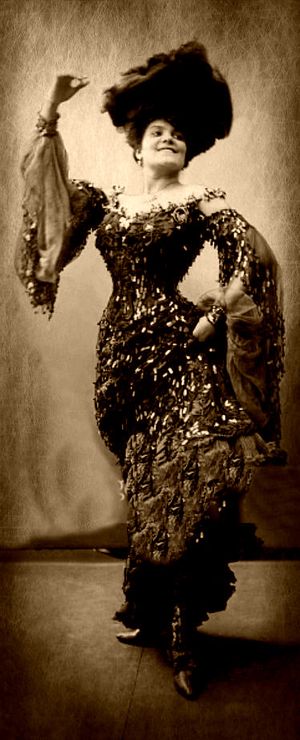Annotation:Dora Dean: Difference between revisions
Created page with "[[{{BASEPAGENAME}}|Tune properties and standard notation]] ---- <p><font face="garamond, serif" size="4"> '''DORA DEAN'''. Old-Time, Country Rag. F Major ('A' part) & D Minor ('B..." |
No edit summary |
||
| (17 intermediate revisions by 3 users not shown) | |||
| Line 1: | Line 1: | ||
[[ | {{TuneAnnotation | ||
|f_annotation=[[File:Doradean.jpg|right|300px|thumb|Dora Dean]]'''DORA DEAN'''. American, Country Rag (cut time). F Major ('A' part) & D Minor ('B' part). Standard tuning (fiddle). AA'BB'BB'. This 'raggy' melody was composed by the great Black entertainer and comedian Bert Williams (1874-1922) and published in 1896 ("Oh have you seen Miss Dora Dean, She's the sweetest gal you ever seen"). Mark Wilson remarks that it was a popular piano piece around the turn of the 20th century; widely popular at the time, it was coined “The Greatest Coon Song Ever Written”. The song was composed in honor of vaudeville entertainer named Dora (Babbage) Dean, an African-American woman who possessed great style, poise and personality, and flaunted in front of white crowds in ways that were unheard of by a Black performer. Along with her partner and husband, Charles Johnson, she is credited with helping to popularize the Cakewalk dance. Their song-and-dance act took them abroad for months on end, touring Europe and even Australia. They performed in Hungary and Russia, even for England’s King Edward VII. | |||
<blockquote> | |||
'''DORA DEAN'''. | ''Say, have you seen Miss Dora Dean?''<br /> | ||
< | ''She is the finest gal you’ve ever seen;''<br /> | ||
<br | ''I’m a-goin’ try and make this gal my queen,''<br /> | ||
''Next Sunday morning I’m goin’ to marry Miss Dora Dean.''<br /> | |||
</blockquote> | |||
'' | It is, however, a version of "[[I Don't Love Nobody (1)]]." Modern fiddle versions are usually sourced to the playing of peripatetic and regionally influential Eastern Kentucky/W.Va. fiddler [[wikipedia:Ed Haley]] (1883-1951). | ||
<br> | |f_printed_sources=Clare Milliner & Walk Koken ('''Milliner-Koken Collection of American Fiddle Tunes'''), 2011; p. 164. | ||
<br | |f_recorded_sources=Rounder 1131/1132, Ed Haley - "Forked Deer" (1997. Originally recorded by Ralph Haley on a home machine in 1947 in Ashland, Ky.) | ||
|f_tune_annotation_title=https://tunearch.org/wiki/Annotation:Dora_Dean > | |||
}} | |||
'' | --------------- | ||
<br> | ------------- | ||
</ | |||
'' | |||
---- | |||
Latest revision as of 23:36, 24 March 2023

Say, have you seen Miss Dora Dean?
She is the finest gal you’ve ever seen;
I’m a-goin’ try and make this gal my queen,
Next Sunday morning I’m goin’ to marry Miss Dora Dean.
It is, however, a version of "I Don't Love Nobody (1)." Modern fiddle versions are usually sourced to the playing of peripatetic and regionally influential Eastern Kentucky/W.Va. fiddler wikipedia:Ed Haley (1883-1951).

